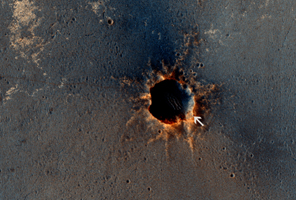Opportunity is Still Smiling

Figure 1
Click on the image for larger version
The High Resolution Imaging Science Experiment (HiRISE) camera on NASA's Mars Reconnaissance Orbiter acquired this color image on March 9, 2011, of "Santa Maria" crater, showing NASA's Mars Exploration Rover Opportunity perched on the southeast rim.
The rover is the bluish speck at about the four o'clock position on the crater rim (with indicator arrow on Figure 1). North is up. Rover tracks are visible to the west of the crater.
Opportunity has been studying this relatively fresh, 90-meter-diameter (295-foot-diemeter) crater to better understand how crater excavation occurred during the impact and how it has been modified by weathering and erosion since. Note the bright blocks and rays of ejecta surrounding the crater.
Spectral information from the Compact Reconnaissance Imaging Spectrometer for Mars (CRISM), which is also on the Mars Reconnaissance Orbiter, indicates a hydrated sulfate at this location. Opportunity will soon resume a long-term trek toward a much larger crater, Endeavour. Santa Maria is about 6 kilometers (about 4 miles) from the rim of Endeavour crater, where CRISM indicates both hydrated sulfates as well as phyllosilicates that formed in a wetter past.
This view is one product from the HiRISE observation catalogued as ESP_021536_1780.
Comparisons with earlier HiRISE images of Santa Maria crater (PIA13706 and PIA13754) show the site before and shortly after the rover's arrival.
The High Resolution Imaging Science Experiment is operated by the University of Arizona, Tucson. The instrument was built by Ball Aerospace & Technologies Corp., Boulder, Colo. NASA's Jet Propulsion Laboratory, a division of the California Institute of Technology in Pasadena, manages the Mars Reconnaissance Orbiter and Mars Exploration Rover projects for NASA's Science Mission Directorate, Washington. Lockheed Martin Space Systems, Denver, is NASA's industry partner for the Mars Reconnaissance Orbiter project and built that spacecraft.
